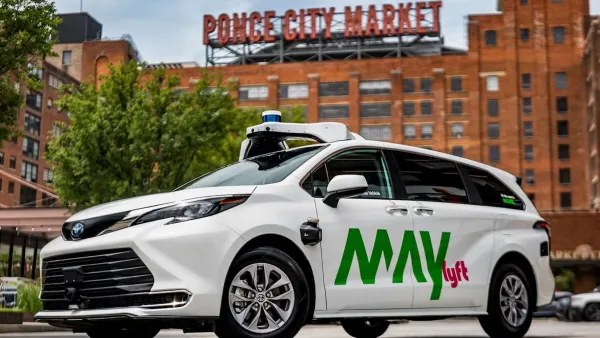A new study on the potential benefits of autonomous cars concludes that "platooning" self-driving vehicles could increase highway efficiency by 273 percent, reports Devin Coldewey.
A paper being presented this week at an Institute of Electrical and Electronics
Engineers (IEEE) conference on vehicular technology concludes that "by banding together into groups, driving much closer to one another than
humans do, and working out the best possible solution to things like
merging and changes in traffic," self-driving cars could dramatically increase the efficiency of the nation's highways. Other recent research supports the conclusions of the paper's author, Patcharinee Tientrakool of Columbia University.
"However far off it may be, transit officials are probably impatient for
that day," writes Coldewey. "Doubling or tripling the capacity of the highways without
spending billions on new lanes and other considerations is a city
planner's dream - to say nothing of the commuters, whose trip to work
would be shorter, safer, and easier."
FULL STORY: Robot cars could increase highway efficiency 273 percent: Study

Planetizen Federal Action Tracker
A weekly monitor of how Trump’s orders and actions are impacting planners and planning in America.

Chicago’s Ghost Rails
Just beneath the surface of the modern city lie the remnants of its expansive early 20th-century streetcar system.

Amtrak Cutting Jobs, Funding to High-Speed Rail
The agency plans to cut 10 percent of its workforce and has confirmed it will not fund new high-speed rail projects.

Ohio Forces Data Centers to Prepay for Power
Utilities are calling on states to hold data center operators responsible for new energy demands to prevent leaving consumers on the hook for their bills.

MARTA CEO Steps Down Amid Citizenship Concerns
MARTA’s board announced Thursday that its chief, who is from Canada, is resigning due to questions about his immigration status.

Silicon Valley ‘Bike Superhighway’ Awarded $14M State Grant
A Caltrans grant brings the 10-mile Central Bikeway project connecting Santa Clara and East San Jose closer to fruition.
Urban Design for Planners 1: Software Tools
This six-course series explores essential urban design concepts using open source software and equips planners with the tools they need to participate fully in the urban design process.
Planning for Universal Design
Learn the tools for implementing Universal Design in planning regulations.
Caltrans
City of Fort Worth
Mpact (founded as Rail~Volution)
City of Camden Redevelopment Agency
City of Astoria
City of Portland
City of Laramie





























